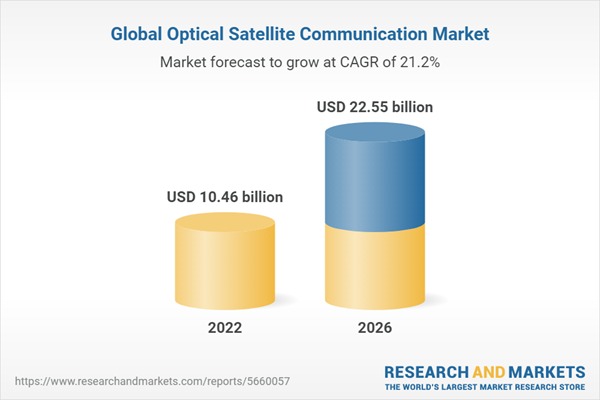The global optical satellite communication market is expected to grow from US$ 8.50 billion in 2021 to US$ 10.46 billion in 2022 at a compound annual growth rate (CAGR) of 23.1%. The optical satellite communication market is expected to reach US$ 22.55 billion in 2026 at a CAGR of 21.2% according to Research and Markets.

Major players in the optical satellite communication market are Mynaric AG, Analytical Space Inc., ATLAS Space Operations Inc., BridgeSat Inc., Hisdesat Servicios Estrategicos S.A., Maxar Technologies Ltd., Mitsubishi Electric Corporation, SITAEL S.p.A, Ball Aerospace & Technologies Corp., Bridgecomm Inc, Clutch Space Systems, Skyloom Global Corp., Hfcl Limited, Aperture Optical Sciences Inc, Honeywell Aerospace, Synspective Inc, Toray International Inc., and Transcelestial Technologies, among others.
The optical satellite communication market consists of sales of optical satellite communication devices by entities (organizations, sole traders, and partnerships) that are used to provide signals around the earth that help to provide effective communication between widely separated geographical points. Optical satellite communication (OSC) refers to a space-based digital data transmission system that uses an optical transmitter that encrypts a message into an optical signal. This is a technology that involves the use of optical fibers for the purpose of communication.
The main types of components in the optical satellite communication market are transmitter, receiver, modulator, demodulator, and others. The transmitter is a device that converts information into light waves at the sending point. A laser beam carries data through space, after which it is received by an optical receiver, which decodes the signal and sends it to its destination, where another optical-to-electrical converter translates it back into electrical signals for further processing. The different laser types include YAG laser, silex laser, microwave laser, CO2 laser, and AIGaAs laser diode, which are used in several applications such as backhaul, surveillance and security, tracking and monitoring, earth observation, enterprise connectivity, research and space exploration, telecommunication, and others.
North America was the largest region in the optical satellite communication market in 2021. The regions covered in the optical satellite communication market report are Asia-Pacific, Western Europe, Eastern Europe, North America, South America, Middle East and Africa.
The optical satellite communication market research report is one of a series of new reports that provides optical satellite communication market statistics, including optical satellite communication industry global market size, regional shares, competitors with an optical satellite communication market share, detailed optical satellite communication market segments, market trends and opportunities, and any further data you may need to thrive in the optical satellite communication industry. This optical satellite communication market research report delivers a complete perspective of everything you need, with an in-depth analysis of the current and future scenario of the industry.
The increase in penetration of smartphones is expected to propel the growth of the optical satellite communication market going forward. Smartphones refer to portable electronic gadgets with features such as the internet and integrated software applications that can perform computer functions. Smartphones depend on optical satellite communication for proper functioning, as this satellite communication helps to provide communication signals in remote areas. For instance, in 2021, according to the National Health Authority of India, an Indian government agency, there were 1.18 billion mobile connections, 600 million smartphones, and 700 million Internet users in India, which is increasing by 25 million every quarter. Therefore, the increase in the penetration of phone users is driving the growth of the optical satellite communication market.
The emergence of laser communication relay systems has emerged as a key trend gaining popularity in the optical satellite communication market. Major companies operating in the optical satellite communication sector are focused on developing new advanced systems to sustain their position in the market. For instance, in 2021, NASA, a US-based space agency, launched its new Laser Communications Relay Demonstration (LCRD) system. The LCRD will help the agency with optical communication in space. It will use optical communications instead of radio communications, which will further help increase the bandwidth 10 to 100 times more than radio frequency systems.
In November 2021, CACI, a US-based information technology company, acquired SA Photonics for a deal amount of $275 million. Through this acquisition, CACI will broaden its capabilities and services in the areas of free-space optical (FSO) communication, laser communications provider, supporting space, and airborne and terrestrial communications. SA Photonics is a US-based company that manufactures, designs, and develops advanced optical communications systems.





